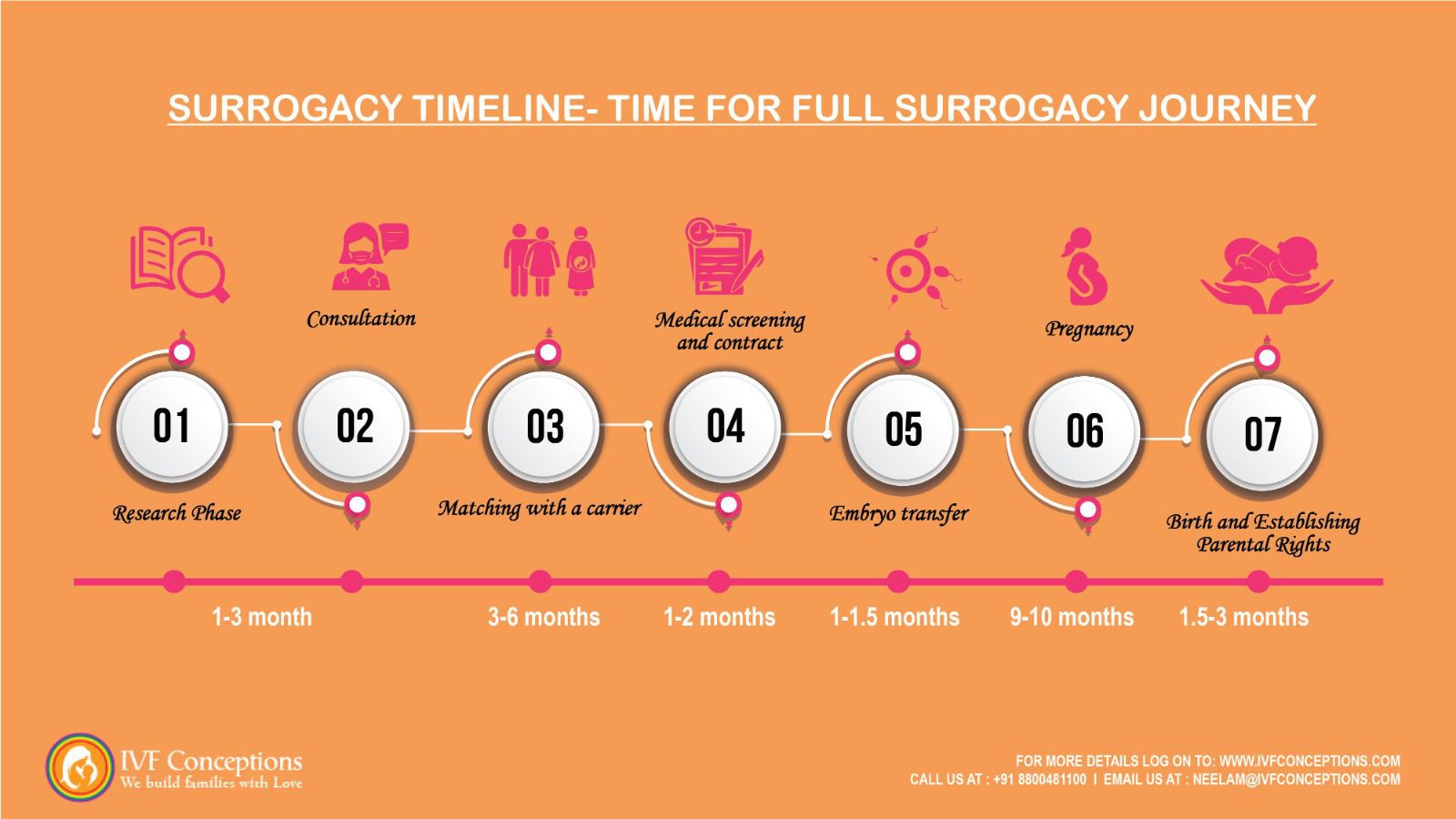Gestational Surrogacy In New Jersey: A Comprehensive Guide


When you look into surrogacy in New Jersey, you’ll discover that the state’s surrogacy rules make the procedure challenging but doable for both intended parents and potential surrogates.
Consider the various surrogacy laws in New Jersey before beginning a surrogacy to see if it is the best course for you. Any surrogacy in New Jersey carries particular dangers and difficulties.
It’s crucial to be aware that surrogacy is tricky legally in New Jersey. This is due to:
- Particular surrogacy amendments in New Jersey must be adhered to.
- Gestational surrogates are only permitted to receive “reasonable expenses,” which do not include a base payment, according to New Jersey law.
Traditional surrogacy is uncommon in New Jersey since it can only be done if the surrogate receives no payment and there is no pre-birth surrogacy agreement.
If you are considering surrogacy in New Jersey, we encourage you to speak with an experienced surrogacy attorney in this area to learn more about whether this is the right path for you and your family.
Since New Jersey has laws against compensation for surrogacy, the people who choose to complete this family-building process here always complete altruistic surrogacies.
Get in touch for a Free Surrogacy Consultancy:
📲 +91-8800481100 ( WhatsApp, Line, Viber)
Surrogacy costs resources worldwide:
Top 4 cheapest countries for surrogacy
Best Countries for Surrogacy 2024- Top International Destinations
Risks of international surrogacy
Global International Surrogacy Options
Surrogacy In Mexico-Everything Intended Parents Need To Know
Cheapest Country For Gay Surrogacy- Colombia
Low-cost surrogate mother in Argentina
Low-cost surrogate mother in Kazakhstan


An Overview Of Gestational Surrogacy in New Jersey
Thanks to changes made to New Jersey’s surrogacy regulations in 2018, gestational surrogacy is now permitted in the state. The particular conditions and procedures for each gestational surrogacy in New Jersey are outlined in these changes. A surrogacy in this state can only be secured and authorized by adhering to certain limitations. A gestational surrogate may only be compensated for “reasonable expenses,” which specifically include:
- Legal services and attorney costs
- reasonable living costs, including those for food, clothes, shelter, medical care, and counseling services
Both gestational and conventional compensated surrogacy agreements are unenforceable in New Jersey. The payment of living expenses, similar to those permitted in an adoption, is permitted in both surrogacy routes. State law permits only gestational surrogacy arrangements.
Traditional surrogacy is challenging to execute in New Jersey due to the complications and publicity of the case back in 1988. Due to the surrogate’s genetic connection to the child, compensation for the surrogate and pre-birth agreements are not possible. Traditional surrogacy agreements are void, and any non-genetic intended parents will need to adopt the child after birth.
The gestational carrier, her spouse (if applicable), and each intended parent must sign a gestational surrogacy contract in writing. The procedure must be carried out after the intending parents and surrogate have been screened but before any further medical procedures may start.
The surrogate’s willingness to undergo embryo transfer, give up custody of the child after birth, and her right to make medical decisions after informing the intended parents must all be explicitly stated in the contract.
The use of a donor gamete has no impact on the non-biological parent’s capacity to seek a pre-birth order as long as the intended parents are carrying out a gestational surrogacy that has been approved by the state.
According to New Jersey’s surrogacy legislation, a gamete donor is not the biological parent of the child who is conceived and has no legal or parental obligations to that child.
Surrogacy Laws In New Jersey

 Every surrogacy journey within the state is crucially built around the surrogacy statute of New Jersey.
Every surrogacy journey within the state is crucially built around the surrogacy statute of New Jersey.
Its main goal is to establish an understandable and comprehensive framework that protects the rights and interests of all parties involved, including intended parents, surrogates, and—most crucially—the fetus. This legal framework guarantees that the surrogacy procedure goes smoothly, ethically, and by the law, in addition to outlining the rights and obligations of each party.
If you’re thinking about taking surrogacy in New Jersey, there are generally five significant legal considerations you should be aware of:
- Only contracts for gestational surrogacy are enforceable
➔ The New Jersey Act only upholds agreements with gestational carriers. As a result, the egg that was utilized to produce the child that the prospective surrogate is now carrying must not have been contributed.
➔ The embryo must instead have been created using the sperm and egg of the intended parents or using gametes the intended parents received through a gamete donation.
➔ The process will be regarded as an adoption when a surrogate is genetically linked to the child she is carrying, and any surrogacy contract that the parties sign will be void.
- Intended parents and surrogates must adhere to certain legal standards.
The parties must adhere to the following requirements in order to be eligible under New Jersey law:
Parents-to-be must
- do a psychiatric assessment to determine their fitness for a gestational carrier agreement.
- Be represented by an attorney who advises them of the agreement’s terms and any potential legal repercussions.
Potential surrogates should:
- The age of majority is 21.
- have at least one child to their credit
- finish the medical assessment
- Finish the psychological assessment
- Obtain legal advice from a different attorney (whose fees may be covered by the intended parents) who speaks with the surrogate about the provisions of the surrogacy contract and any potential legal repercussions of becoming a surrogate in New Jersey.
- Gestational carriers have the right to compensation for reasonable out-of-pocket costs incurred during pregnancy and postpartum recovery.
➔ Even though a surrogate cannot be paid for her services, she may be reimbursed for reasonable charges she incurs, such as reasonable living expenses as well as medical, hospital, counseling, and other such costs.
➔ The law permits a surrogate to be compensated for her living costs throughout pregnancy and during a recovery period following delivery.
➔ To make sure all costs are covered and you are fully compliant with New Jersey law, your surrogacy lawyer will outline the acceptable payments in the contract.
- It is feasible for intended parents to place pre-birth orders.
➔ No matter their genetic link to the child or their marital status, intended parents can get a pre-birth parentage order as long as they comply with the New Jersey Surrogacy Act’s standards and sign a contract that is compliant with the law.
➔ The intended parents will be listed as the child’s legal parents in this pre-birth order, and the document will be submitted to the relevant vital records office when the baby is born.
➔ As a result, the child’s birth certificate will list the intended parents as the child’s parents.
- Gestational carrier agreements must meet certain requirements in order to be upheld in court.
Your lawyer can start drafting the contract as soon as everyone has passed the required psychological and medical exams. Your attorneys will ensure that the contract complies with the statutory requirements, which call for the inclusion of the following clauses:
- The gestational carrier’s consent to:
- Go through an embryo transfer procedure (and any related medical procedures), and try to carry and deliver a child.
- After delivery, give the intended parents custody of the child.
- Make her own medical decisions after communicating them in writing to the intended parent(s).
- agreement, where applicable, of the spouse who is the gestational carrier to likewise be bound by the conditions of the agreement
- The goal of the intended parent(s) is:
- After birth, accept custody of the child and legal responsibility for it.
- after birth, take full responsibility for raising the child


How Much Does Surrogacy Cost in New Jersey?
The average cost of surrogacy in New Jersey is one of the highest in the country, ranging from $120,000 to $210,000. Due to the individuality of each infertility situation, which necessitates a customized medical solution, there is a wide variety of pricing. We acknowledge the vast range. There are a variety of factors that can affect surrogate costs. These could involve different fees for medical testing at your fertility clinic, surrogate costs, etc.
The estimated fees roughly consist of:
| Type of Surrogacy Expenses | Cost of Surrogacy in New Jersey |
| ➢ Compensation of the surrogate mother | ➢ $56,000-$75,000 |
| ➢ Agency Management fees | ➢ $22,000-$35,000 |
| ➢ Legal fees | ➢ $7,000-$12,000 |
| ➢ Medical screening, Embryo transfer, And Medications | ➢ $8,000-$13,000 |
| ➢ Prenatal And Delivery Care of the Surrogate | ➢ $12,000-$28,000 |
| ➢ Other(Travel,insurance,monitoring ETC) | ➢ $2,500-$4,800 |
Related surrogacy Costs guides:
What is the average surrogacy cost?
How much does surrogacy cost in Ukraine?
How much does surrogacy cost in Georgia?
How much does surrogacy cost in India?
What is the Surrogacy Cost in Colombia?
What is Surrogacy cost in Mexico?
What is surrogacy cost with family members?


Surrogacy Journey For Intended Parents In New Jersey
Same-sex couples are likewise permitted to become parents through surrogacy under New Jersey’s surrogacy law. Only through a post-birth order are male gay couples able to acquire an initial birth certificate listing both partners as parents. The non-biological parent can obtain parental rights by adoption within three months of the child’s birth, and the biological father will be given the name Father.
The New Jersey Gestational Carrier Agreement Act allows for surrogacy. This law, though, exclusively covers gestational surrogacy. Traditional (genetic) surrogacy, on the other hand, is only permitted if it is done on an uncompensated basis and there is no prior arrangement to provide for the child after one is born. The intended parents must adopt a surrogate mother in order to revoke her parental rights and have her name removed from the child’s birth certificate.
Because every surrogacy experience is different and there is no one-size-fits-all solution, the first thing intended parents should know is that there is no such thing as the best surrogacy agency in New Jersey.
It’s essential for anyone thinking about being a surrogate to research the legal, moral, and practical ramifications. Below given are important things to keep in mind:
- Legal Framework
- Choosing the right agency
- Preparing yourself emotionally
- Financial planning
- Medical considerations
It’s imperative to arm yourself with knowledge before starting this path, work with reputable surrogacy organizations and facilities, and place a priority on emotional support and legal observance. A remarkable journey filled with love, hope, and the prospect of a new family awaits those who choose to become intended parents through surrogacy.
Surrogacy Process In New Jersey

 Understanding the complexities of the surrogacy process is essential for a successful and rewarding experience because starting the surrogacy journey is a significant step toward realizing parenthood. We’ll examine each stage of the surrogacy procedure,
Understanding the complexities of the surrogacy process is essential for a successful and rewarding experience because starting the surrogacy journey is a significant step toward realizing parenthood. We’ll examine each stage of the surrogacy procedure,
STEP 1: CHOOSE IF SURROGACY IN NEW JERSEY IS THE RIGHT OPTION FOR YOU.
STEP 2: WITH YOUR CHOSEN SURROGACY PROFESSIONAL, FORM A SURROGACY PLAN WITH YOUR NEW JERSEY SURROGACY AGENCY
STEP 3: COMPLETE THE PRE-SURROGACY SCREENING IN NEW JERSEY
STEP 4: FIND THE RIGHT SURROGATE FOR YOUR SURROGACY PROCEDURE IN NEW JERSEY
STEP 5: MAKE A SURROGACY AGREEMENT WITH THE HELP FROM NEW JERSEY LAWYER
STEP 6: COMPLETE THE MEDICAL PROCESS AND EMBRYO TRANSFER AT NEW JERSEY’S FERTILITY CLINIC.
STEP 7: WELCOME YOUR BABY AND COMPLETE THE PROCESS OF SURROGACY IN NEW JERSEY.
Finding A Gestational Surrogate Mother In New Jersey
A crucial phase of the surrogacy process that demands considerable thought and direction is the search for a surrogate mother. A woman must fulfill a number of requirements before she can agree to act as a gestational carrier in a surrogacy process:
- She should be between the ages of 21 to 40
- had at least one healthy child
- had no previous history of pregnancy difficulties (for instance, no deliveries before 35 weeks, unless she had twins or more)
- under any accumulating 2 C-sections
- fewer than 5 deliveries overall
- a solid financial standing without receiving any government aid (such as housing assistance, food stamps, WIC, or state-funded insurance);
- unblemished criminal histories
- no negative habits or dependencies (no smokers or drug users);
- U.S. citizenship or a status of permanent residency;
- the proper body mass index (BMI) for height and weight;
- furnish the fertility clinic with medical records
- no active STIs, cancer, substance addiction, heavy medication use, or history of chemotherapy or radiation
- acceptance of undergoing a psychological assessment
- medical testing is being done on her husband or partner
- following all screening and counseling guidelines and being completely devoted to the intended parents
There is a careful and deliberate process involved in finding a surrogate mother. The following are a few typical Ways to find a surrogate mother:
➔ Surrogacy agencies
➔ Online surrogacy marketplaces
➔ legal councils and fertility clinics
➔ Fertility Clinics
➔ Surrogacy-related events and support groups
➔ Social Media And Classifieds
Whatever strategy you choose, it’s imperative to carefully research and vet any prospective surrogates. It may be required to conduct medical, psychiatric, and criminal background checks to ensure that the surrogate is both physically and psychologically prepared for the process.
Conclusion
Researching all possibilities is crucial when it comes to fertility and childbirth in order to ensure the intended parents’ interests and concerns. In New Jersey, surrogacy is an authorized procedure. The state offers chances for women who wish to be surrogate moms as well as for couples and single people who want to grow their families through surrogacy. It is advised to conduct research initially in order to choose the best personal answer.
If you’d like to learn more about surrogacy, IVF, Egg Donation, or international surrogacy services globally, check out the rest of our website at IVF Conceptions. We offer legally secure and affordable surrogacy consulting services for FREE. We recommend and assist with legalized gestational surrogacy globally.
Get in touch for a Free Surrogacy Consultancy:
📲 +91-8800481100 ( WhatsApp, Line, Viber)


Frequently Asked Questions about New Jersey Surrogacy
1. What is surrogacy?
Surrogacy is a method of assisted reproduction where a woman carries and delivers a baby for another person or couple. In New Jersey, surrogacy can offer hope to individuals or couples who are unable to conceive on their own.
2. How does surrogacy work in New Jersey?
Surrogacy in New Jersey involves a legally binding agreement between the intended parent or parents and a gestational carrier. This process typically includes using in vitro fertilization (IVF) to create an embryo using the intended parent’s or donor’s genetic material, which is then transferred to the surrogate’s uterus.
3. What are the laws regarding surrogacy in New Jersey?
Surrogacy laws in New Jersey have been established to protect the rights of all parties involved. The New Jersey Gestational Carrier Act outlines the legal requirements and procedures for surrogacy arrangements in the state.
4. How can someone become a surrogate in New Jersey?
To become a gestational surrogate in New Jersey, individuals must meet specific criteria and undergo a thorough screening process conducted by a reputable surrogacy agency. The surrogate must be mentally and physically prepared for the surrogacy journey and meet the legal requirements set forth in state law.
5. What is the surrogacy process like in New Jersey?
The surrogacy process in New Jersey involves multiple steps, including matching intended parents with a suitable surrogate, undergoing medical and psychological evaluations, and drafting a detailed surrogacy contract that outlines the rights and responsibilities of all parties involved.
6. Are there specific requirements for surrogates in New Jersey?
Surrogates in New Jersey must meet certain criteria, such as having previously given birth without complications, passing medical and psychological screenings, and being fully committed to the surrogacy journey.
FAQs for surrogacy in the USA
Q1. What is the process of surrogacy in the USA for intended parents?
Ans. The surrogacy process in New Jersey for intended parents involves multiple steps, starting with a consultation to discuss your story and questions. Working with an experienced agency in surrogacy guides you through milestones like choosing an agency, finding a surrogate, medical screening, and legal contracts.
Q2. How much does surrogacy in the USA cost?
Ans. The cost of surrogacy in the USA varies depending on the program you choose. The cost of surrogacy starts at $150,000 to $200,000 based on the specific services needed and the compensation of the surrogate mother and egg donor. For low-cost surrogacy, it is advised to consider “independent surrogacy or private surrogacy”, which costs less but requires more time and management.
Q3. What are some affordable surrogacy options?
Ans. Affordable surrogacy options are:
- Opting for independent surrogacy arrangements.
- Using a surrogate mother within the family or friend circle.
- Considering the international surrogacy countries with affordable, low-cost surrogacy programs like Mexico, Colombia, Argentina, Georgia, and Ukraine.
Q4. What are the requirements for becoming a surrogate mother in the USA?
Ans. The requirements for becoming a surrogate mother are:
- To become a surrogate mother, you must meet certain criteria.
- You should have delivered a child of your own and be parenting at least one child.
- Uncomplicated pregnancies and deliveries are necessary, as documented by medical records.
- Age requirements are between 21 and 44 years old.
- The Body Mass Index (BMI) is typically no higher than 33.
- Surrogates should be citizens, legal residents, or legal immigrants of the United States.
- medically and psychologically in sound condition.
Q5. Can you help us find a low-cost surrogate mother?
Ans. Yes, we have been working in the international surrogacy domain for 13 years and have good networks of fertility clinics and surrogacy agencies globally that are trusted to offer world-class services. We have long expertise and experience in the best and most legal international surrogacy countries.
Disclaimer:
All legal information on this website is intended only as a guide and is not a replacement for the opinions of licensed legal professionals/Medical professionals. Some information may have changed since the time of publication. We advise you to consult a licensed attorney/Medical expert with authority in fertility/surrogacy processes.